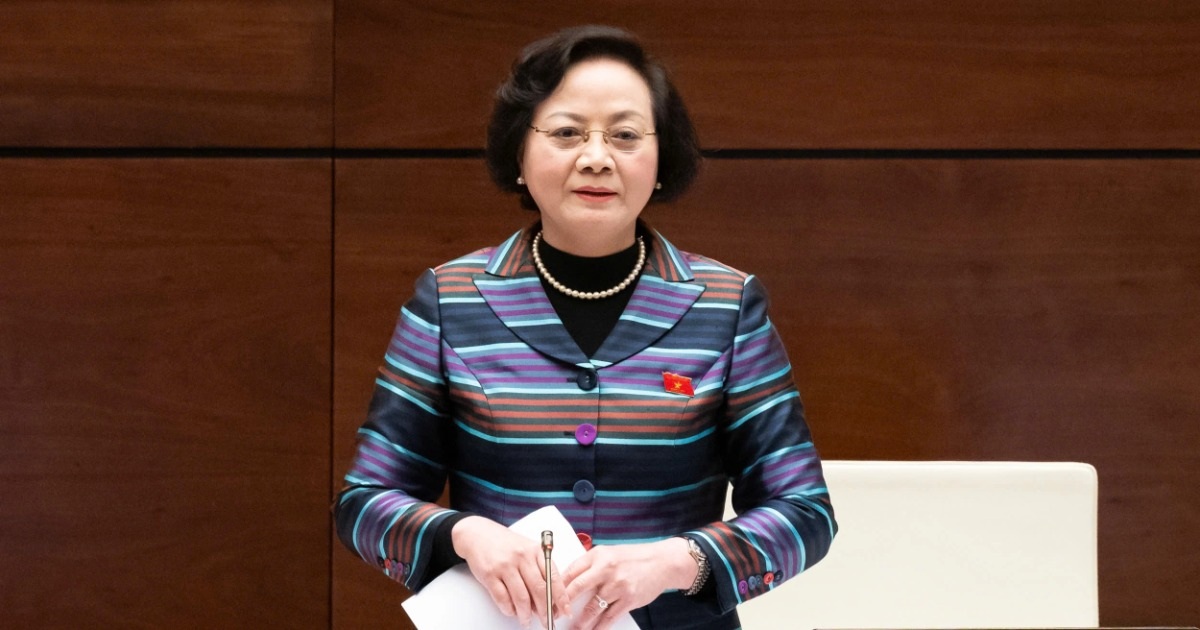The draft amendment to the Law on Government Organization was discussed by National Assembly delegates in the morning session on February 14, with significant attention paid to regulations regarding decentralization, delegation, and authorization.
Proposing Conditional Delegation Only When Localities Are Capable
Delegate Tran Van Khai (Ha Nam) expressed concerns about the potential for fragmented power and overlapping authority when delegation is not clearly defined, particularly between central and local governments.
As an example, he noted that critical tasks such as planning, public investment, land management, and environmental protection fall under both the government’s responsibility and local jurisdiction. This overlap could lead to policy implementation disputes.
National Assembly Delegate Tran Van Khai (Photo: Hong Phong).
Local authorities might abuse their powers and lack oversight when granted autonomy, making decisions based on self-interest rather than adhering to national policies.
“Some resource-rich provinces or economically strong cities may exploit decentralization to establish preferential policies, while weaker localities might lack the capacity to implement them, causing delays,” Mr. Khai pointed out.
He proposed adding a principle of conditional delegation, granting authority only when localities demonstrate sufficient financial resources, governance personnel, and evaluated administrative capabilities. Additionally, he called for stronger central oversight, including forming a council to monitor delegation processes closely.
Mr. Khai also emphasized the need for mechanisms to assess the effectiveness of decentralization, requiring annual evaluations and periodic reviews by the National Assembly.
Regarding authorization, the delegate warned that insufficient oversight could result in buck-passing among government levels during task execution.
National Assembly delegates at the extraordinary 9th session on February 14 (Photo: Hong Phong).
Furthermore, unchecked authorization could create administrative fiefdoms, where certain regions make unilateral decisions without proper evaluation, disrupting policy implementation.
Mr. Khai recommended limiting the scope of authorization to routine administrative tasks, avoiding delegation of macro-policy decisions.
“Decentralization, delegation, and authorization are inevitable trends, but they require strict control mechanisms,” he stressed.
Innovative and Groundbreaking Revisions
Addressing the delegates’ opinions, Minister of Home Affairs Pham Thi Thanh Tra emphasized that the Law on Government Organization is the foundational law of Vietnam’s administrative system.
This revision, according to the minister, holds political, social, legal, and historical significance as Vietnam streamlines its governance apparatus to enhance efficiency, effectiveness, and unlock development potential in a new era.
Minister Tra highlighted the comprehensive and innovative approach to revising the law, guided by directives from the Communist Party, General Secretary, and National Assembly Chair. The law focuses on overarching principles to ensure longevity and balance between state management and developmental goals.
Minister of Home Affairs Pham Thi Thanh Tra emphasizes the importance of the core administrative law (Photo: Pham Thang).
The amendments align with the central directive to clarify authority distribution between the government, central agencies, and local administrations, addressing overlaps and ensuring the government’s role as the highest administrative body implementing executive power and serving as the National Assembly’s operational arm.
Minister Tra elaborated on the groundbreaking aspect of this revision: improving principles for decentralization, delegation, and authorization as constitutionally mandated.
“This aims to foster initiative, creativity, autonomy, and accountability across the system, especially within local governments,” she emphasized.
Additionally, the draft provides a crucial legal framework to remove barriers related to decentralization and delegation embedded in numerous specialized laws.
According to recent audits, out of 257 laws, 177 regulate ministerial authority, 152 govern the Prime Minister’s powers, 141 detail People’s Council and People’s Committee jurisdictions, and 92 specify all levels of local authority.
“How can we implement decentralization and delegation effectively? This revised law must serve as the foundation, setting principles for all specialized laws and regulatory documents,” Minister Tra stated.
Another breakthrough involves legislative authorization measures to address issues in hundreds of specialized laws.
“This innovative approach is a wise decision by the National Assembly, unprecedented yet essential for Vietnam’s unique historical context to propel us into a new era,” Minister Tra added.
She further explained that the law clarifies the government’s role in relation to the National Assembly, Supreme People’s Court, and Supreme People’s Procuracy, ensuring unity, division of labor, coordination, and oversight of state power.
The law also delineates the authorities of the government, Prime Minister, ministries, and local governments, resolving current inefficiencies where tasks are unnecessarily escalated to higher levels.
Regarding decentralization, delegation, and authorization, Minister Tra affirmed these provisions are pivotal, providing a legal basis for all subordinate laws to follow.
The drafting team will incorporate feedback from the National Assembly discussions to finalize the best possible version for approval during this session.



